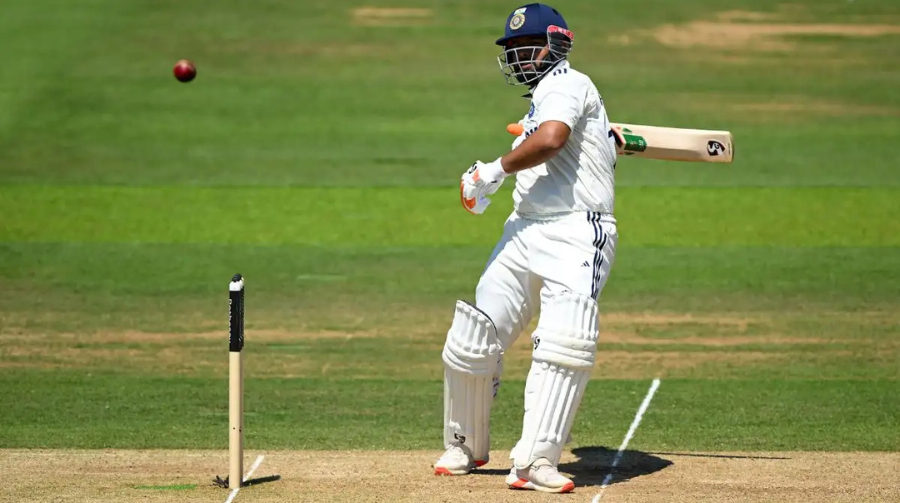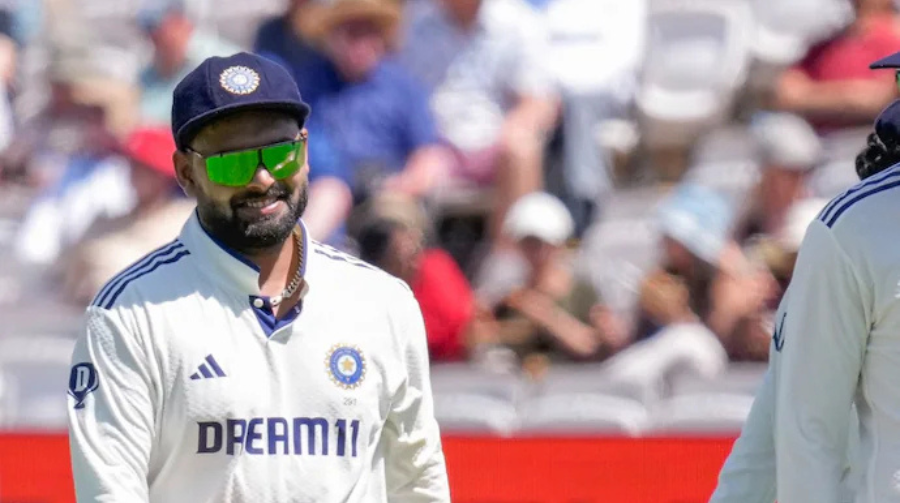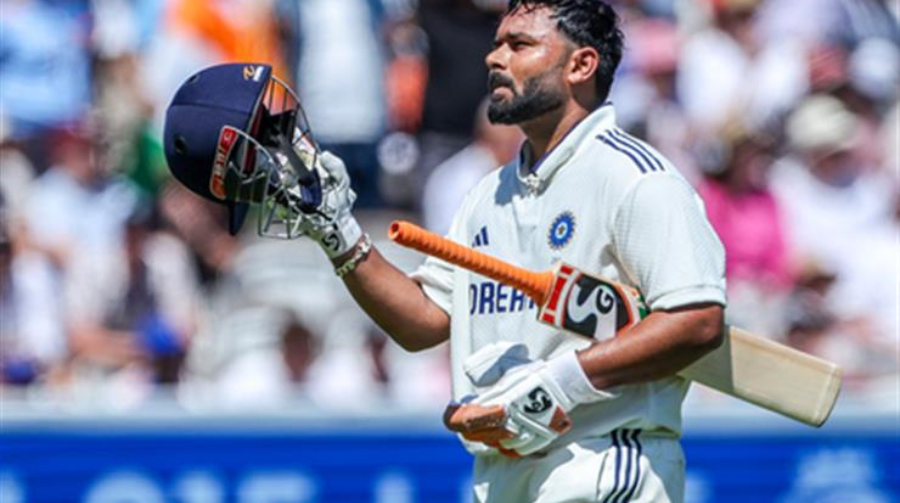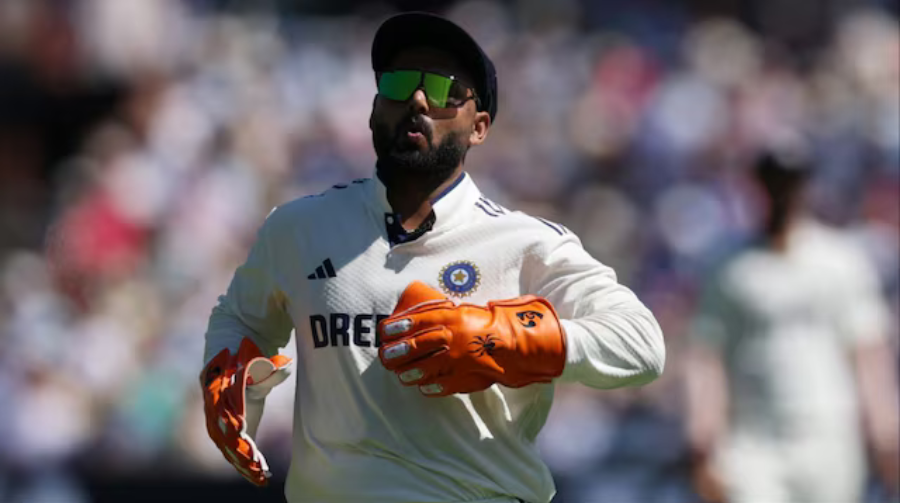Cricket
Ravi Shastri: “Rishabh Pant Shouldn’t Play If He Can’t Keep Wickets” Ahead of 4th England Test

Ravi Shastri, India’s former head coach, emphasized that Pant should not be included in the Manchester XI unless fully fit to keep wickets. He warned that playing as a specialist batter would require Pant to field—and that poses a high risk of aggravating his injury If he fields, that will be worse… Without gloves… it’ll worsen the injury.
Shastri added that only complete recovery—no fractures—should determine Pant’s participation: If it is a break… he rather rests it and comes fully fit at The Oval. He can’t do one of the two.

Injury Details & Series Importance
- Pant’s injured left index finger sidelined him from keeping at Lord’s; Jurel substituted
- India’s assistant coach Ryan Ten Doeschate noted that Pant could bat during practice, and if fit, will play—but keeping will be the final hurdle
- With India trailing, Pant’s batting form—425 Test runs at an average of 70.83—is vital

Balancing Fitness & Form
Ravi Shastri highlighted a tough choice for the management:
- Inclusion as specialist batsman without keeping could expose the injury further through fielding.
- Playing as wicketkeeper-batsman demands full recovery and fitness.
- If Pant rests, he may return refreshed for the series finale at The Oval—ensuring long-term fitness over immediate gain

Series Implications
- Pant’s explosive form has been a cornerstone for India.
- A mismanaged selection decision could jeopardize his long-term fitness and team balance.
- Strategy and patience may be key—either field him fully fit or let him recuperate fully before the final Test.

Final Take
Ravi Shastri’s advice echoes across team management: “One must not risk a match-winner’s long-term fitness for the immediate allure of a single Test.” With Pant’s fitness the pivot, India must weigh his explosive batting against the potential cost to his career and the team’s momentum.
Cricket
Italy Celebrate Historic T20 World Cup Win Over Nepal With Bollywood Icon Kabir Bedi

History was made at the Wankhede Stadium on February 12 as Italy registered their first-ever victory in the ICC Men’s T20 World Cup, defeating Nepal by a commanding 10 wickets.
The celebrations that followed were emotional, historic — and star-studded.
Italy’s players marked the moment with renowned Bollywood actor Kabir Bedi, who shares a deep connection with Italy and has long been a celebrated figure in the country.
A Dream Realised for Italian Cricket
Chasing a modest target of 124, Italy completed the task in just 12.4 overs without losing a wicket. As the winning runs were scored, Italian Cricket Federation president Simone Gambino was visibly emotional, shedding tears as decades of effort finally bore fruit.
Standing beside him during the celebrations was Kabir Bedi — an old friend and cultural icon in Italy.
For those unaware, Bedi achieved immense popularity in Italy after starring in the 1976 Italian television miniseries Sandokan. In the show, he portrayed the rebellious pirate “Sandokan,” also known as the Malaysian Tiger, a character that became a household name in Italy.
“In Italy they only know you. The Malaysian Tiger — Kabir Bedi,” Gambino said during the emotional exchange.
Kabir Bedi Congratulates Italy in Italian
The Italian cricket team shared a video on their official Instagram account showing Bedi congratulating Gambino and interacting with the players — even speaking in Italian.
Bedi also reflected on how Gambino had long dreamed of putting Italy on the global cricket map — a dream that now appears within reach.
The moment symbolised not just a sporting achievement, but also a cultural bridge between India and Italy.
Italy Send Warning to England
Buoyed by the historic win, Gambino even issued a bold statement about their ambitions in the tournament.
With the 10-wicket victory over Nepal, Italy leapfrogged England in Group C on net run rate and moved to third place in the standings.
“I would’ve never imagined this moment. But now we are going right back to Kolkata to shoot down England. We want to be in semis,” Gambino said in a celebratory video.
While the comment was made in excitement, it reflects Italy’s growing confidence as they continue their World Cup journey.
Mosca Brothers Power Italy to Victory
On the field, Italy delivered a near-perfect performance.
After opting to bowl first, Italy restricted Nepal to 123 runs.
- Crishan Kalugamage starred with figures of 3/18 in four overs.
- Ben Manenti was equally economical, conceding just nine runs while picking up two wickets.
In reply, the Mosca brothers sealed the historic win:
- Justin Mosca
- Anthony Mosca
The duo stitched together an unbeaten 124-run opening partnership, completing the chase in emphatic fashion and ensuring Italy’s first-ever T20 World Cup victory.
What This Win Means for Italy
This result is significant for several reasons:
- 🇮🇹 Italy’s first win in T20 World Cup history
- 📈 Improved net run rate and stronger qualification hopes
- 🌍 Boost for cricket’s growth in non-traditional European nations
- 🎥 A viral cultural moment featuring Kabir Bedi
Italy’s victory not only energises their campaign but also highlights the expanding footprint of cricket beyond traditional powerhouses.
Cricket
Rain Threat for India vs Pakistan T20 World Cup Clash — Colombo Weather Forecast for February 15

The highly anticipated India vs Pakistan group stage clash in the ICC Men’s T20 World Cup 2026 is scheduled for February 15 at the R. Premadasa Stadium in Colombo, Sri Lanka. Ahead of this blockbuster fixture, weather forecasts have sparked fresh concerns about rain interruptions potentially affecting play.
Weather Conditions Ahead of Match Day
Colombo has experienced wet weather patterns this month, disrupting several warm-up fixtures and prompting worries about further interruptions. While the main tournament matches played so far have proceeded with minimal long delays, forecasts suggest cloudy skies and scattered rain in the days leading up to the India–Pakistan showdown.
According to weather models:
- February 14 could see cloudy conditions with rain around the afternoon and evening — possibly overlapping with pre-match preparations.
- On February 15, skies are expected to remain mostly cloudy with occasional bright spells, but isolated showers or thunderstorms cannot be ruled out, particularly during early evening hours when the match will be underway.
Overall, Colombo’s February monthly averages show a modest amount of rainfall spread over several days, meaning weather volatility is a normal feature this time of year.
What This Means for the Game
If rain moves in during the India vs Pakistan match, several scenarios could unfold:
- Delayed toss or later start depending on intensity and timing of rain
- Intermittent stoppages, especially during heavy cloud bursts
- Reduced overs decided by DLS if rain affects a portion of play
Stadium officials will be on high alert, and ground staff will deploy covers and drainage as soon as showers begin. The R. Premadasa venue has good drainage systems, which can help resume play more quickly after short rain spells.
Fans and officials alike will be hoping for a full uninterrupted contest, but given Colombo’s current weather trend and February’s moderate wet risk, a degree of uncertainty remains.
Key Takeaway
While complete washout is not the most likely outcome, the chance of isolated showers or thunderstorms on February 15 means that rain could delay or interrupt the India vs Pakistan T20 World Cup match in Colombo. Advance planning by teams and match officials will be crucial to managing any weather disruptions and ensuring maximum cricket is played.
Cricket
‘Thank God’: Harry Brook’s Honest Reaction After England’s Loss to West Indies Goes Viral

England suffered a 30-run defeat to the West Indies in the 15th match of the T20 World Cup at the Wankhede Stadium in Mumbai on Wednesday. Chasing a challenging target of 197, the 2022 champions fell short, raising fresh concerns about their campaign.
However, it wasn’t just the loss that grabbed attention — it was England captain Harry Brook’s candid post-match reaction that quickly went viral.
Brook’s “Thank God” Moment
After the defeat, Brook admitted that England were fortunate to have edged past Nepal in their previous game. England had narrowly escaped with a four-run win in that encounter, thanks to a brilliant final over from Sam Curran, who successfully defended 10 runs under pressure.
Reflecting on the situation, Brook said:
“Thank God we won against Nepal the other night, otherwise we’d be in a tricky situation. But we obviously play Scotland and Italy next, and yeah, we’ve just got to go back, do our homework on them and go back to the basics and see how we go.”
His remark highlighted how precarious England’s position could have been had they slipped up against Nepal. With one win and one loss so far, England remain in contention — but their margin for error is narrowing.
England’s Struggles Continue
England’s campaign has been far from convincing. Against Nepal, despite posting 184 runs, their bowling unit nearly let the game slip before Curran’s composure in the final over saved them.
The issues were more pronounced against the West Indies. While the Caribbean side posted 196, England’s chase never fully gathered momentum, particularly in the middle overs.
Spin Woes Exposed
The West Indies’ spin trio — Gudakesh Motie, Roston Chase, and Akeal Hosein — played a decisive role in the victory. Together, they claimed six wickets for 94 runs in 12 overs, effectively dismantling England’s middle order.
Motie was especially impressive, dismissing Harry Brook, Jacob Bethell, and Tom Banton, tightening the screws at a crucial stage of the chase.
Despite the visible struggle, Brook insisted that England do not have a fundamental issue against spin.
“Not disappointed… we thought it was gonna dew up a little bit and the spinners would slide on a little bit more. Unfortunately, that didn’t happen tonight. And yeah, we’ll go back and have a reflection on it and go again in a few days.”
What This Means for England
The loss leaves England in a delicate position in the group stage. Their upcoming matches against Scotland and Italy now carry added importance. While England will likely start as favourites in both fixtures, their inconsistent performances mean they cannot afford complacency.
Key Concerns:
- Middle-order vulnerability against quality spin
- Death bowling inconsistencies (excluding Curran’s heroics vs Nepal)
- Over-reliance on individual brilliance
Positives:
- Strong batting depth on paper
- Experience in high-pressure tournaments
- A relatively manageable remaining group schedule
Bigger Picture
Brook’s honesty reflects a team aware of its flaws but confident in its ability to bounce back. However, in T20 cricket, momentum is everything. Another slip-up could push England dangerously close to elimination — something unthinkable for the defending champions just weeks ago.
With Scotland and Italy next on the schedule, England’s path forward is clear: reset, recalibrate, and deliver.
-

 Celebrity Lifestyle9 months ago
Celebrity Lifestyle9 months agoEx-Cricketer Shikhar Dhawan Buys Ultra-Luxury Apartment Worth ₹69 Crore in Gurugram
-

 Crime & Investigation7 months ago
Crime & Investigation7 months agoDelhi Police SI Neetu Bisht Caught Taking ₹20 Lakh Bribe – Shocking Details Emerge in Corruption Probe
-

 Glamour & Entertainment8 months ago
Glamour & Entertainment8 months agoTelegram Channels Disseminating Pro‑Russian Propaganda in Poland
-

 Entertainment8 months ago
Entertainment8 months agoAbhijeet & Dr Tarika Reunite in CID 2 — Fans Say ‘Clear the Misunderstanding Now
-

 Business8 months ago
Business8 months agoAmazon sets 30‑day relocation deadline for corporate staff—opt out by resigning in 60 days
-

 Bollywood6 months ago
Bollywood6 months agoNo ₹3 Lakh Fine or 2-Year Jail: The Truth Behind the ‘Hakla’ GIF Buzz
-

 Travel & Adventure8 months ago
Travel & Adventure8 months agoBest Places to Hangout in Delhi (2025): Top 10 Picks for Fun & Chill
-

 News8 months ago
News8 months agoWar Intensifies: Iran’s Nuclear Sites, Hospitals Hit in Escalating Israel Clash – 10 Big Developments




